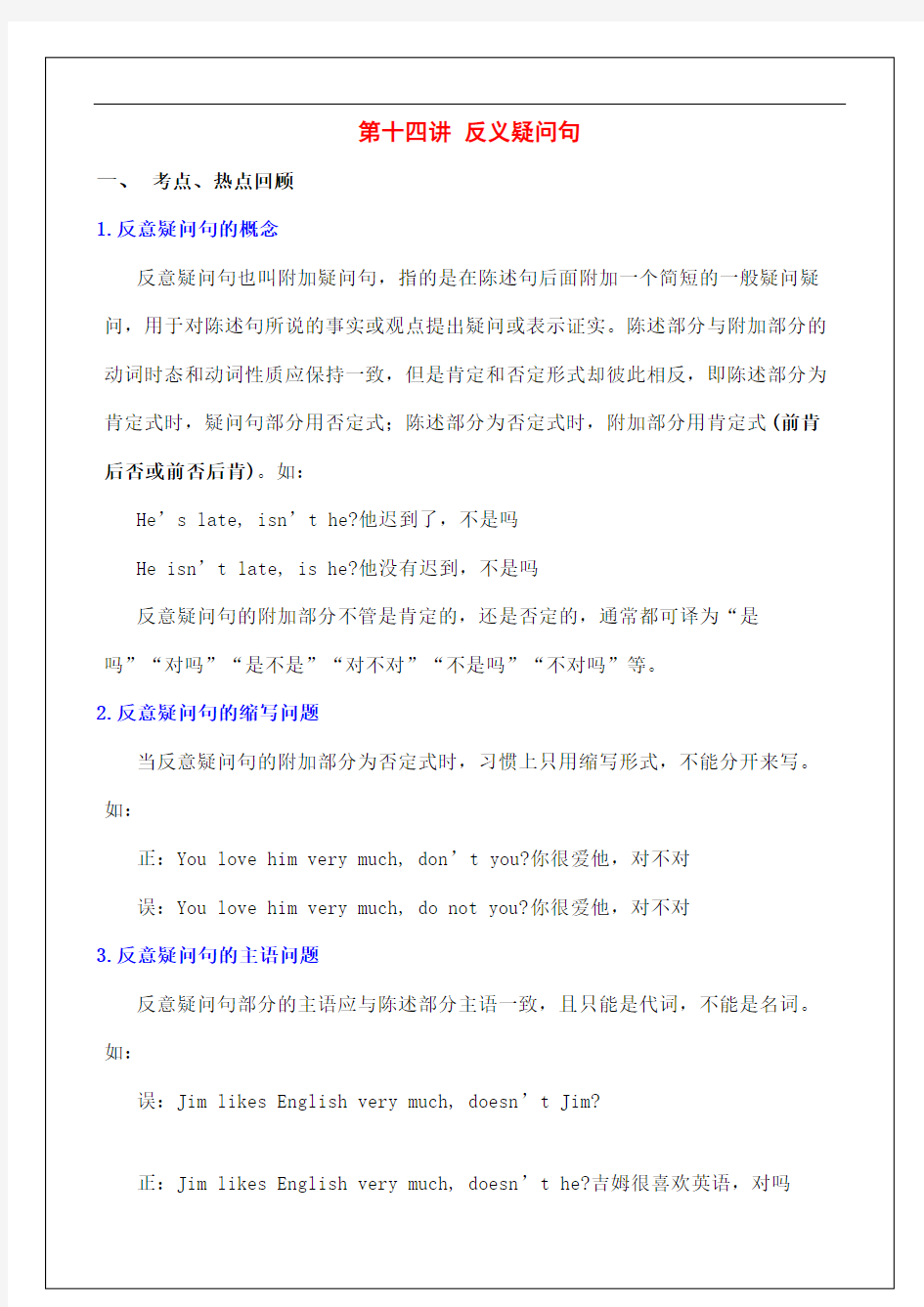高中反义疑问句讲解精讲精析老师(终审稿)


高中反义疑问句讲解精
讲精析老师
文稿归稿存档编号:[KKUY-KKIO69-OTM243-OLUI129-G00I-FDQS58-
第十四讲反义疑问句
一、考点、热点回顾
1.反意疑问句的概念
反意疑问句也叫附加疑问句,指的是在陈述句后面附加一个简短的一般疑问疑问,用于对陈述句所说的事实或观点提出疑问或表示证实。陈述部分与附加部分的动词时态和动词性质应保持一致,但是肯定和否定形式却彼此相反,即陈述部分为肯定式时,疑问句部分用否定式;陈述部分为否定式时,附加部分用肯定式(前肯后否或前否后肯)。如:
He’s late, isn’t he?他迟到了,不是吗
He isn’t late, is he?他没有迟到,不是吗
反意疑问句的附加部分不管是肯定的,还是否定的,通常都可译为“是
吗”“对吗”“是不是”“对不对”“不是吗”“不对吗”等。
2.反意疑问句的缩写问题
当反意疑问句的附加部分为否定式时,习惯上只用缩写形式,不能分开来写。如:
正:You love him very much, don’t you?你很爱他,对不对
误:You love him very much, do not you?你很爱他,对不对
3.反意疑问句的主语问题
反意疑问句部分的主语应与陈述部分主语一致,且只能是代词,不能是名词。如:
误:Jim likes English very much, doesn’t Jim?
正:Jim likes English very much, doesn’t he?吉姆很喜欢英语,对吗
4.反义疑问句疑问句部分动词的使用
疑问句部分动词的使用要根据陈述句而定.
Be 动词
1. You are an actor, ____________
2. She is going to visit me, ___________
3. It wasn’t fine yesterday, ________
行为动词:
1. It often rains here, ___________
2. You have a headache, ________
3. I called you yesterday, _______
4. It doesn’t rain here, ______
5.You didn’t call me yesterday, ______
助动词/情态动词:
1. You will go to America, ___________
2. We have ever been to Shanghai, ________
3. He hasn’t done his homework, _________
4. You should try your best, ____________
5.反义疑问句的回答问题
不管前句是肯定的还是否定的,回答时内容是肯定的, 就用yes; 反之, 则用no It didn’t rain last week, ___ it上周没下雨吧
didn’t。如:
The old man used to smoke, didn’t he?或usedn’t he
Tom used to live here, usedn’t he?或didn’t he
(14).当陈述部分带有情态动词ought to时,疑问部分用oughtn’t或shouldn’t。如:
He ought to know the answer, oughtn’t he?
We ought to read this book, oughtn’t we?或shouldn’t we
(15).当陈述部分含有had better时,疑问部分用had。
如:You’d better finish your homework now, hadn’t you
(16). 陈述部分有would rather +动词原形,附加疑问部分多用 wouldn't +主语。
He would rather read it ten times than recite it, wouldn't he?
(17). 陈述部分有You'd like to +动词原形,附加疑问部分用wouldn't +主语。
You'd like to go with me, wouldn't you?
(18).感叹句后的附加疑问句的谓语动词需用be的现在时,且常用否定形式。如:
What a clever boy, isn’t he
